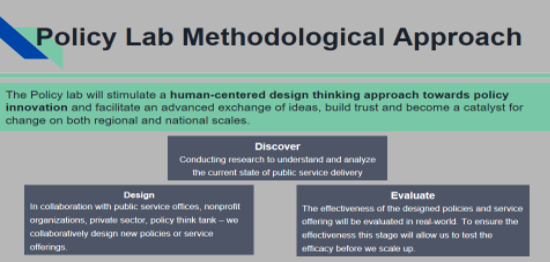Approach & Method
The Policy Lab employs multi-prolonged strategies such as design thinking and human-centric innovation, institutional and capacity building, policy advocacy and strategies, networking, and collaborating for synergy. The Policy Lab accomplishes its objective by using a four-stage process i.e. i) Discover, ii) Design, iii) Evaluate, and iv) Scale-up.
It is briefly described below:
Phase 1: Discover
At Policy Lab projects begin by conducting research in order to understand and analyze the current state of public service delivery. Service providers and their users are engaged to visualize people’s experiences and activities and identify shared needs.
Phase 2: Design
In collaboration with public service offices, nonprofit organizations, the private sector, policy think tank, etc. we collaboratively design new policies or service offerings. We turn our research insights into design objectives which are tested for their effectiveness.
Phase 3: Evaluate
At this stage, we define a theory of change to guide the evaluation. The effectiveness of the designed policies and service offering is evaluated in the real world. To ensure the effectiveness this stage allows us to test the efficacy before we scale up.
Phase 4: Scale Up
Based on the evaluation of the designed policies and services, we then disseminate and scale it up that suits best for better service delivery.
Moreover, at Policy Lab, a team of people from diverse disciplines and background with knowledge of different areas of policy innovation such as project management, software design, data visualization, communication, and other relevant areas work together for a common purpose. The core team in interaction with different ministries, experts, students, and public agencies find out the problems that need attention. Experts from the ministries, universities, stakeholders from the community, and other social organizations and the student sit together and interact with an aim to stimulate innovative ideas to tackle the issue. Further, primary data can be collected for authenticity. Based on the information and knowledge derived from the data, different prototypes can be designed, tested, develop and ultimately recommend to the concerned party for policy reformation. Hence, the Policy Lab would adopt problem recognition, agenda-setting, prototype building, policy formulation, testing the prototype, and ultimately creating discourse and dialogue with different stakeholders for policy transformation.
Expected Outcomes
At the end, the Policy Lab would contribute to achieving the following aspects:
A. Policy Research
The Policy Lab conducts research and publishes commentary on public policy through Policy Lab Journal, in partnership with Kathmandu University, government agencies, ministries, diplomatic agencies, journalists, civil society organizations, academics, and businesses. In addition, it would develop the public policy model and methods (powerful tools and techniques) with a clear-cut roadmap at the federal, provincial, and local levels.
B. Policy Advocacy
The Policy Lab advocates for policies that reflect the viewpoint and best interests of the public with a truly representative mix of policy leaders through direct engagement with government agencies, bilateral and multilateral agencies, ministries, journalists, academics, and businesses. In addition, this provides an avenue for university students and experts to engage and reach out to a larger number of young people who desire to learn and know more about Public Policy and Governance.
C. Result Demonstration and Showcase
After diagnosing and rigorous analysis, it demonstrates and showcase the public policy analysis and making process, thereby prescribing for informed decision making. It develops confidence and satisfaction of all possible stakeholders engaged in public policy-making processes while addressing the contentious public policy and management issues, thereby improving people’s well-being and prosperity.
D. Policy Innovation
By using human-centered design thinking principles, programs in the Policy Lab drives policy innovations to serve the needs of the changing environmental and technological landscape.


